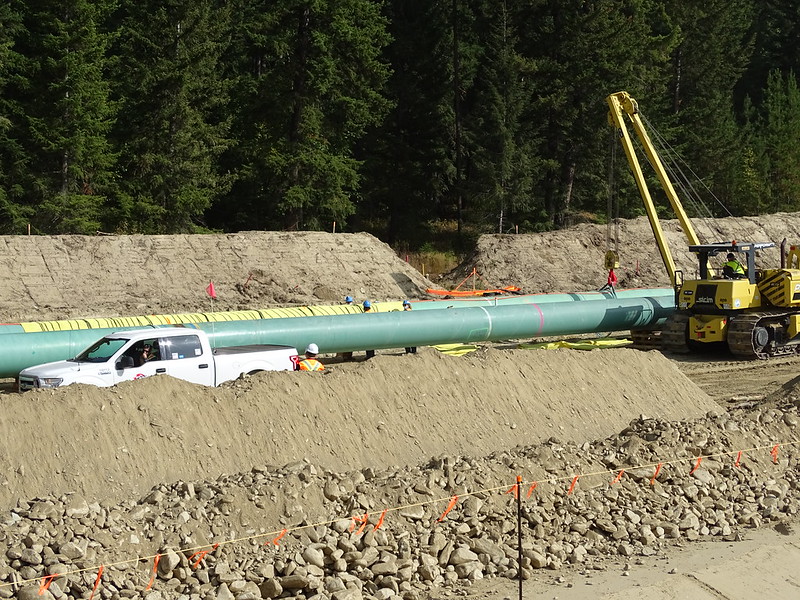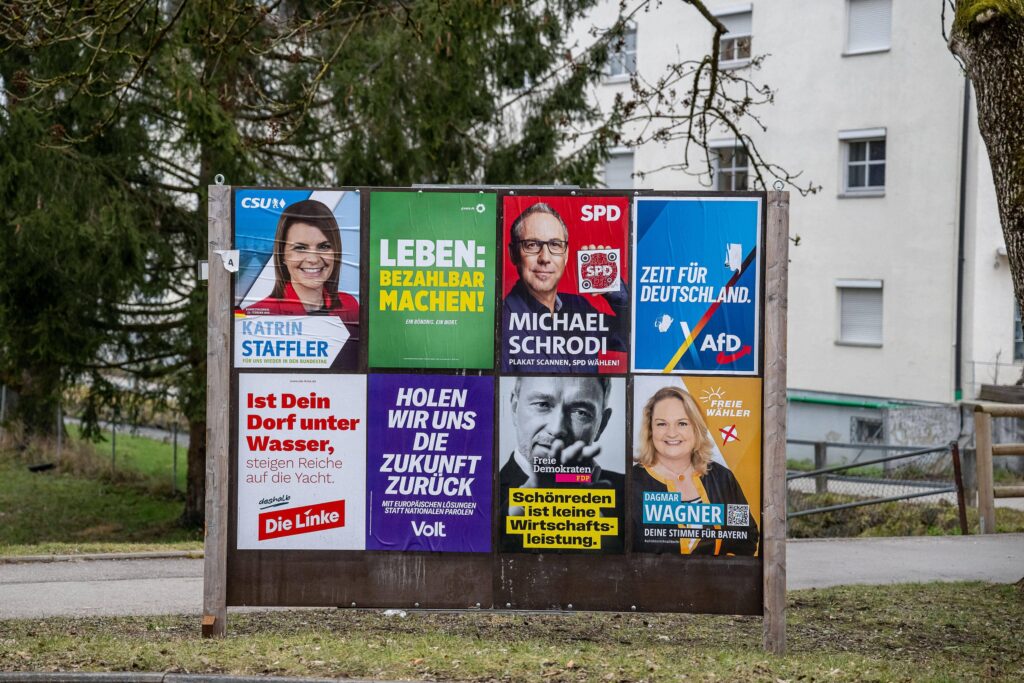Many of the world’s most polluting companies are being handed a “get out of jail free” card by being invited to shape a scaled-up offsetting market, campaigners claim.
The Taskforce on Scaling Voluntary Carbon Markets is due to publish its “roadmap for implementation” on Wednesday, four months after it was launched by former Bank of England Governor Mark Carney, who is now a UN Special Envoy for Climate Action and Finance.
Carney’s group wants to hugely scale up the existing market, making it “large, transparent, verifiable and robust”. This, it claims, will help private corporations meet the UK’s net zero target by 2050, in line with Paris Agreement targets to limit the worst impacts of climate change by restricting global warming to 1.5C or “well below” 2C.
But critics have questioned whether the taskforce’s membership – which includes oil majors, banks and airlines – is best placed to shape the future of that market, given their problematic histories of delivering carbon offsetting projects.
Like what you’re reading? Support DeSmog by becoming a patron today!
‘Wild West’
The concept of “net zero” poses a significant challenge to private companies, 20 of which have contributed to a third of all global emissions.
Corporations often claim they are using offsets as a last resort, after decarbonisation and carbon capture and storage options have been exhausted. But critics say there is limited evidence that counter-balancing carbon dioxide emissions in this way actually works.
The practice of offsetting is itself controversial. Offsetting involves buying a carbon credit – one tonne of verified carbon dioxide equivalent – which removes, replaces or avoids the equivalent amount of carbon emitted into the atmosphere, usually by funding a carbon-saving project in the developing world.
Interest in the voluntary carbon market – which allows buyers to offset some of their greenhouse gas emissions – has correspondingly surged, as businesses look for ways to rapidly slash their overall carbon footprint. Latest figures from non-profit Forest Trends show corporate carbon-neutral pledges led to transactions of carbon credits surging to cover 104 million tonnes of carbon dioxide in 2019.
But the effectiveness of forest offsets traded through the UN’s existing REDD+ programme (the acronym to describe reducing emissions from deforestation and forest degradation, and the role of conservation, sustainable management of forests and enhancement of forest carbon stocks in developing countries) has plagued the existing voluntary carbon market, along with concerns over lack of regulation.
Carney has cited these concerns as a motivating factor for the taskforce, acknowledging that the current market is “opaque, cumbersome and fragementated”, with a recent Telegraph investigation calling it a “Wild West” of ineffective schemes.
Problematic pasts
A number of green NGOs are involved in funding and overseeing the taskforce, but this hasn’t stopped it being accused of corporate capture, with companies with mixed records on offsetting, including oil majors such as Shell, BP and Total, to airlines like Easyjet and Etihad, and banking groups Merrill Lynch, BNP Paribas, BlackRock and UBS, having a strong presence in the group.
Shell
The world’s seventh highest historic polluter has long bought credits from accredited REDD+ projects, predominantly from the Katingan Mentaya project in Indonesia, and the Cordillera Azul national park in Peru.
Both projects are designed to conserve carbon stocks in existing forest reserves, but their effectiveness has been highly contested. In 2019, a joint Dutch and Indonesian investigation into the Katingan Mentaya project highlighted an increase in forest fires and land conflict around the project area, concluding that proving the permanent avoidance of carbon emissions was nearly impossible. According to the article, international banking group and taskforce member BNP Paribas also purchased carbon credits from the project.
Another investigation by Danish journalists in December 2020 looked at the Cordillera Azul national park in Peru, quoting experts who also said deforestation had increased directly outside the REDD+ zone, and major forest fires had broken out inside the project area — a common criticism of REDD+ projects.
Shell has also been criticised for projects closer to home, after announcing a number of new offset projects as part of a $300 million investment in “natural climate solutions”. Last year it emerged that Scottish Government officials warned each other that partnering with Shell to fund forests for carbon offsetting could be seen as “greenwashing” – before ultimately accepting £5 million for the million-tree project.
That initiative feeds into Shell’s Drive Carbon Neutral programme, by creating 250,000 credits towards offsetting customer emissions. The scheme – now in the UK, the Netherlands, Canada, Germany and Denmark – has faced ongoing criticism, with experts asking whether it encourages, rather than prevents, a business-as-usual attitude among corporations and individuals.
Shell’s new nature-based unit has been undeterred by external criticism, recently acquiring Select Carbon, which works with landowners to improve the carbon yield of nine million hectares of land in Australia. It has even started selling its own nature-based credits. Last week airline Etihad – also a taskforce member – announced it was expanding its current offset programme to include Shell’s projects in the Katingan Mentaya, as well as the Cordillera Azul in Peru.
Defending its record on carbon offsetting, Shell told DeSmog: “Independent third-party verification companies evaluate and review the projects regularly to assure CO2 reductions are real … Shell only trades credits that have been assessed by independent third-party processes.”
BP
Fellow oil major BP has also been pursuing forest offsets for the past decade. In 2011 it paid $5 million into the World Bank’s Carbon Fund that it helped found, part of the UN’s deforestation prevention carbon trading scheme. At the time, BP said it wanted to “increase our understanding of the evolution of carbon markets and policy, as well as helping to catalyse the development of this important sector”.
However, campaigners accused BP of becoming involved in the Forest Carbon Partnership Facility (FCPF) to greenwash its image, a year after it was found responsible for the 5 million barrel oil spill in the Gulf of Mexico. BP was the only energy company involved in the fund, and just the second non-governmental body, after conservation NGO The Nature Conservancy (TNC) joined in 2007. TNC, which has previously worked with Shell on its strategy for nature-based solutions, is also represented on Carney’s taskforce as a Consultation Group member.
FCPF was intended to “jump-start a forest carbon market”, but a report by NGO Fern described the partnership as “smoke and mirrors”, saying it had failed to achieve social and environmental improvements. A letter written by Rainforest Foundation UK and other NGOs to World Bank President Jim Yong Kim in 2017, a decade after the programme first launched, claimed the millions spent on administering the programme had not translated into saving trees.
The FCPF’s perceived lack of success did not stop BP from exploring other offset avenues. In 2019, the company invested $5 million into Finite Carbon, the largest US forest carbon offset developer, before becoming the largest shareholder in the business.
Read more – Investigation: The Problem with Big Oil’s ‘Forest Fever’
Like Shell, BP has developed its own offset programme, “Target Neutral”, allowing customers to offset emissions through funding forest management in Zambia and more efficient cookstoves in India. The initiative is also used to offset harmful greenhouse gases from Air BP, which claims to be the first aviation fuel provider to have achieved carbon neutral operations globally.
Oil majors have also been burnishing their climate credentials on a global stage. During COP25, the UN’s 2018 climate summit in Madrid, both BP and Shell were introduced as founding members of the new International Emissions Trading Association (IETA)’s advisory panel for its Markets for Natural Climate Solutions. Dozens of environmental and Indigenous activists walked out in protest over the involvement of oil companies and fears the scheme would discourage companies from making substantial emissions cuts.
Just this month, the Scottish Greens accused BP of “classic greenwash” after it paid £2 million to expand Scotland’s native woodlands. Friends of the Earth Scotland said the emissions the scheme would save were “trivial” compared to the company’s contribution to climate change, whilst campaign group Glasgow Calls Out Polluters said the contribution was a “paltry sum” that allowed the company to “pursue their climate-wrecking activities unimpeded”.
A BP spokesman told DeSmog: “We support the use of high quality carbon offsets or credits by companies, countries and society to achieve faster and lower cost pathways to achieving net zero and meeting the Paris goals.”
“We intend to reach our 2030 emissions reduction aims without relying on offsets – but they may help us to go beyond those aims, if we can.”
Easyjet
Airlines have helped fuel the trend for voluntary offsets, as operators respond to the Paris Agreement target of reaching net-zero emissions mid-century. Aviation made up around 2.4 percent of global fossil fuel carbon dioxide emissions in 2018 – around the same as Germany – with emissions expected to triple by 2050 under current projections.
Taskforce member Easyjet was recently revealed as one of the 15 biggest polluters in the UK, but has marketed itself as a climate conscious airline which was the first to offset fuel used for all its customers’ flights. Fellow taskforce member Delta Airlines has also pledged to go “carbon neutral” with the help of offsets, and plans to spend $1 billion over a decade to achieve this.
According to a January 2021 Greenpeace report, BA’s operator International Airlines Group has said it will use forests to offset 30 million metric tons of CO2e per year by 2050. This, together with a similar pledge by Italian oil giant Eni, could exhaust up to 12 percent of the total budget that the IPCC says is available for sequestration in new forests.
Easyjet has been one of the many airlines to be hit by COVID-19 travel restrictions, as the sector continues to suffer during the pandemic. Last year, the low-cost airline faced a backlash after asking the UK government for a bailout weeks after paying £171 million in dividends to its shareholders, including £60 million to its billionaire founder Sir Stelios Haji-Ioannou. Easyjet later secured a £600 million loan from the Bank of England’s emergency bailout scheme, but in May announced it would still be making 30 percent of its workforce redundant. Easyjet told DeSmog it worked with unions to complete the process, which resulted in 1100 crew taking voluntary reduncies.
Offsets go hand in hand with attempts to move to sustainable fuel, but sustainable aviation is still some way from taking off. Delta Airlines and Easyjet are among a growing number of airlines exploring low-carbon fuels, but Shell has just left the UK’s flagship programme — a joint venture with British Airways and Velocys to build a sustainable jet fuels plant in the UK.
A report by the International Council on Clean Transportation found that meeting Paris Agreement targets primarily through low-carbon fuels would be “beyond difficult”, pointing out that biofuels, often used as an alternative to fossil fuels, tend to be made from food crops associated with high land-use change emissions.
Responding to questions from DeSmog, Easyjet defended its involvement in the taskforce, saying:
“Whilst the voluntary carbon offset market is increasingly recognised as having major potential to contribute towards limiting global warming, it remains relatively small and so the Taskforce on Scaling Voluntary Carbon Markets is working to create a framework and mechanisms to stimulate greater rigour and investment for carbon offset projects.”
“We understand that offsetting can only be an interim solution while the zero-emissions technology we need is developed. We are fully committed to the UK Government and EU targets of net zero emissions by 2050 and believe that European aviation should aim to reach net zero earlier than this.”
BlackRock and others
As with airlines, carbon neutrality has become a growing mantra for banking groups. But the companies haven’t always put their money where their mouths are.
In December 2020, a Bloomberg report cast doubt on the integrity of forest offsets bought by taskforce member and the world’s largest asset manager BlackRock in Albany, New York. The article cites project documents that claimed no harvesting had taken place in Albany for nearly 20 years, seemingly contradicting the claims that large areas of the forests would be logged within a decade. BlackRock has been approached for a comment.
And this month, campaigners Reclaim Finance and Urgewald revealed that BlackRock still held $85 billion of shares in coal companies, despite a pledge to sell most of its fossil fuel shares.
BlackRock last year signalled a dramatic shift in financial strategy. In his annual letter to chief executives, CEO Laurence Fink said the climate crisis had brought the company “on the edge of a fundamental reshaping of finance”, calling on “every company, not just energy firms, to rethink their carbon footprints”.
But decarbonising its $7 trillion assets will not be easy, and it’s unclear how reliant BlackRock will be on offsets for its own operations and those of its investors. According to its last sustainability report in 2019, the company had offset 100 percent of its employees’ travel-related emissions since 2017, alongside other carbon-cutting strategies. The decarbonisation approach of BlackRock, which acquired another taskforce member Merrill Lynch in 2009, is likely to have a strong ripple effect in the financial sector.
Consultancy McKinsey & Company, which provides “knowledge and advisory support” to the taskforce, likewise has a chequered history on offsetting. A 2011 report by Greenpeace claimed that McKinsey’s REDD+ cost curve and baseline scenarios were being used to justify expansion of high-carbon industrial capacity in Indonesia, Papua New Guinea, Democratic Republic of Congo, and Guyana. McKinsey has been approached for a comment.
‘Lack of transparency’
Campaigners are concerned that the companies’ problematic past experiences of carbon sequestration and offsetting programmes mean some of the taskforce members are not best placed to make strong recommendations for an effective voluntary carbon market.
Gilles Dufrasne, Policy Officer at NGO Carbon Market Watch, says the key challenge for the taskforce is to “get their priorities straight”.
He told DeSmog: “The key objective should be to drive more finance towards concrete mitigation projects that deliver emission reductions and benefit local people and the environment.”
“The taskforce places a lot of emphasis on increasing the volume of transactions in the market. I think we shouldn’t assume that more transactions necessarily translate into more emissions reductions.”
“There are still legitimate concerns about the integrity and transparency of voluntary markets. For example, some projects issue more credits than they actually reduced emissions, and there is a lack of information regarding who buys which credits and at what price. The taskforce should make sure that it is not about to scale up a non-functional system, and therefore needs to put more emphasis on transparency and quality,” he said.
Dufrasne added that he was particularly concerned over the concept of “core carbon contracts” in the consultation document, “which seem to be designed by and for the financial industry”, and could “make it difficult to track what the underlying climate projects really are”.
Responding to questions raised over the taskforce’s integrity, Chris Leeds, operating team member and Executive Director at Standard Chartered, told DeSmog:
“Carbon markets alone will not address the problem of climate change, however, for large emitters in hard to abate sectors investing in emissions abatement projects and new clean technology can be a key tool to reaching net-zero by 2050. The Taskforce’s aim is to create a transparent, robust voluntary carbon market to better channel needed investment into carbon reduction, avoidance or removal projects.”
He added: “We are working to scale the market and demonstrate how carbon credits can be used legitimately and effectively in net-zero strategies, with the priority being for companies to reduce emissions in the first place.”
There are some supporters of big business’ involvement in the taskforce. Dr Jeremy Woods, a Reader in Sustainable Development at Imperial College London, said initiatives such as this were “hugely overdue, urgent and very much needed”.
“It needs to have core representation of big business as this is where virtually all the investment capital will come from to drive material change to the global value chains needed, and against the almost impossibly short timelines that are implicit to the climate crisis,” he said.
But Dr Doug Parr, chief scientist at Greenpeace UK, said the involvement of some of the companies in the taskforce “raises some huge red flags” and that their involvement could set a “terrible example” to the rest of the world ahead of the annual UN climate talks, COP26, which will be held in Glasgow in November.
DeSmog approached the government’s COP26 unit, which is run by the Cabinet Office, to ask how the taskforce’s blueprint is likely to feed into November’s summit. In response, a spokesman said the taskforce was “a private sector-led initiative, supported by Mark Carney, and independent of UK Government efforts as the hosts of COP26”.
Parr told DeSmog: “The lack of transparency in many of these companies’ plans, and the failure of Carney’s taskforce to impose strict emission reduction requirements on them, suggests they are banking on offsetting as a get out of jail free card in tackling the climate emergency.”
“The failure of offset schemes in the past gives no confidence that Mark Carney’s taskforce can introduce robust rules to guarantee emissions cuts, whilst there’s nothing to make sure corporates still do the necessary heavy lifting on their own performance.”
Main image: © Sam Whitham/DeSmog
Subscribe to our newsletter
Stay up to date with DeSmog news and alerts







